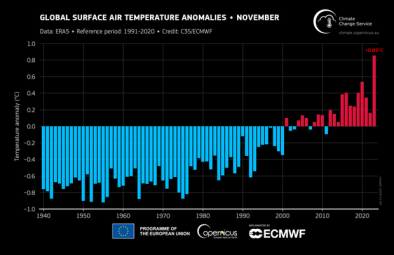Science Source
Emergent constraint on equilibrium climate sensitivity from global temperature variability
- States that equilibrium climate sensitivity (ECS) remains one of the most important unknowns in climate change science
- Defines ECS as the global mean warming that would occur if the atmospheric carbon dioxide (CO2) concentration were instantly doubled and the climate were then brought to equilibrium with that new level of CO2
- States that the ‘likely’ range of ECS as stated by the Intergovernmental Panel on Climate Change (IPCC) has remained at 1.5–4.5 degrees Celsius for more than 25 years
- Presents a new emergent constraint on ECS that yields a central estimate of 2.8 degrees Celsius with 66 per cent confidence limits (equivalent to the IPCC ‘likely’ range) of 2.2–3.4 degrees Celsius
- Focuses on the variability of temperature about long-term historical warming, rather than on the warming trend itself
- Uses an ensemble of climate models to define an emergent relationship between ECS and a theoretically informed metric of global temperature variability
- States that this metric of variability can also be calculated from observational records of global warming, which enables tighter constraints to be placed on ECS, reducing the probability of ECS being less than 1.5 degrees Celsius to less than 3 per cent, and the probability of ECS exceeding 4.5 degrees Celsius to less than 1 per cent
Related Content
Headline

Feb 15, 2024 | Climate Nexus Hot News
Amazon Could Reach Tipping Point By Midcentury
Headline

Jan 16, 2024 | Climate Nexus Hot News
2023 Smashes Hottest Year Record
Headline

Dec 7, 2023 | Climate Nexus Hot News
It’s Official - 2023 Is World's The Hottest Year On Record
Headline

Dec 7, 2023 | Climate Nexus Hot News
Earth Veering Closer To Dangerous Tipping Points


